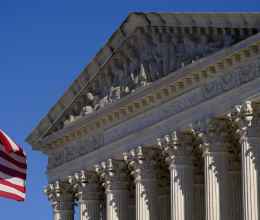Each Friday, we’ll bring you updates on the latest civil liberties news from Maine and the nation.
Prayer Allowed at New York Town’s Public Meetings
On Monday, the U.S. Supreme Court ruled in favor of Greece, N.Y., a town that begins its public board meetings with a prayer. The majority concluded that prayers that open town meetings do not violate the Constitution.
Justice Anthony Kennedy wrote the majority opinion, stating: “Ceremonial prayer is but a recognition that, since this Nation was founded and until the present day, many Americans deem that their own existence must be understood by precepts far beyond the authority of government, to alter or define and that willing participation in civic affairs can be consistent with a brief acknowledgement of their belief in a higher power, always with due respect for those who adhere to other beliefs.”
The American Civil Liberties Union expressed disappointment with the decision. "Official religious favoritism should be off-limits under the Constitution," said Daniel Mach in a statement, director of the ACLU Program on Freedom of Religion and Belief. "Town-sponsored sectarian prayer violates the basic rule requiring government to stay neutral on matters of faith."
Our legal director, Zach Heiden, spoke about this divided ruling on Don Cookson’s radio show earlier this week. Listen to what he has to say here.
Also, take a look at the U.S. Supreme Court Justices' voting records here.
Fighting Bullying by Criminalizing It?
A southern California city, Carson, proposes to make bullying a crime, any time the target is under age 25. The Los Angeles suburb would become the first municipality in the nation to make bullying a crime.
Brendan Hamme, staff attorney for the American Civil Liberties Union of Southern California, said the measure is too vague and does not even spell out how much jail time an offender could potentially face. In California, a misdemeanor crime can carry a maximum sentence of a year in jail.
Read more about this controversial method of combating bullying here.
U.N. Human Rights Chief: Stop Lethal Injection
Clayton Lockett was executed in Oklahoma in late April. The director of the ACLU of Oklahoma called it a "human science experiment." Why? State officials were using an untested mix of lethal drugs, never previously used in that dosage combination.
Despite warnings from medical experts, and requests from defense attorneys to open up the process to review—by the courts, by doctors, and by members of the public - officials proceeded with Lockett’s execution. The result was a botched execution in which Lockett was still alive 43 minutes after it began and apparently died eventually of a heart attack.
This cruel and unusual punishment outraged many around the world. Navi Pillay, the UN High Commissioner for Human Rights issued a statement about the use of untested drugs in lethal injections:
“The apparent cruelty involved in these recent executions simply reinforces the argument that authorities across the United States should impose an immediate moratorium on the use of the death penalty and work for abolition of this cruel and inhuman practice. Thirty-two out of 50 states in the US still have the death penalty in their laws (in addition to the US government and the US military). Eighteen states in the US have abolished the death penalty, most recently Maryland in 2013 and Connecticut in 2012. The UN opposes the use of the death penalty in all circumstances.”
Read the U.N. Statement in full here.








